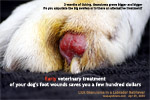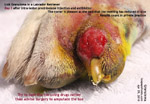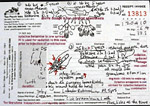|
Toa Payoh
Vets Clinical Research
Making veterinary surgery alive
to a veterinary student studying in Australia
using real case studies and pictures |
Cut off the gigantic inflamed toe?
Dr Sing Kong Yuen, BVMS (Glasgow), MRCVS
Date:
24 April, 2010 |
 toapayohvets.com toapayohvets.com
Be Kind To Pets
Veterinary Education
Project 2010-0129 |
As part of my
training, I asked my assistant what to do in this
case of the Labrador Retriever with a large lick
granuloma in his 5th toe? It is good to ask for
ideas although one may be deemed incompetent in
asking.
"Just cut off the toe from here and stitch up from
there to here," Mr Saw outlined the approach
of "de-clawing in the cat" to cut off the large
granuloma that had existed for one month. The
owner finally sought veterinary advice as the dog
kept licking and licking. If only he had consulted
the vet early, the treatment was so simple and
effective as it would just be a simple wound.
"If you cut this large granuloma, you will have a
very unhappy owner," I said. "The hole will be so
big as the granuloma now covers the second and
third phalanx too. For cat declawing, only the
first phalanx is cut off. In this dog, the area is
inflamed and infected. After cutting off, the
wound will not heal well. The owner is going to
spend more money and the dog is going to lick."
I used the blue marker pen to outline the large
hole as a result of toe amputation surgery. You
can see faint outlines of my blue marking. This
was to show Mr Saw that a large foot hole would
take a long time to heal as the dog would lick it
daily.
 "We can hospitalise the dog and treat for him
after surgery," my assistant suggested. "We can hospitalise the dog and treat for him
after surgery," my assistant suggested.
"No owner will be happy if the dog's wound does
not heal after hospitalisation for a week or two," I explained to
him. "There is the money to be spent and the
lack of cure."
"The first method is to reduce the granuloma size
using anti-inflammatory drugs and antibiotics," I
explained to him. If the granuloma disappears,
there is one happy owner. "If not, the size will
be reduced and surgery to cut it off will be
easier and the hole will be much smaller."
Toe and other lick granulomas are common in dogs.
Owners neglect early vet attention. The instinct
of the vet is to cut it off. Veterinary surgery is
not always the answers to inflammatory granulomas
in the toes.
3 days later, the owner came
because the dog had got rid
of the bandage and was causing the granuloma to
bleed. "But the size has reduced a lot," the lady
owner was pleased. The granuloma was not so angry
dark red in colour and had reduced by 20% in size. So, this time
I bandaged it instead of asking my assistant.
 As
I record this at the 7th day, there is no news from the owner.
From my experience, the toe should shrink back to
normal and the dog owner would be most satisfied.
The veterinary costs would have been less than a
hundred dollars if she had got the dog treated
much earlier. If the toe had been amputated, the
cost of post-operation wound healing would be much
more than the conservative medical treatment. As
I record this at the 7th day, there is no news from the owner.
From my experience, the toe should shrink back to
normal and the dog owner would be most satisfied.
The veterinary costs would have been less than a
hundred dollars if she had got the dog treated
much earlier. If the toe had been amputated, the
cost of post-operation wound healing would be much
more than the conservative medical treatment.
Results count in private practice. Money was not a
problem for this dog owner. However, veterinary
surgery would not be in the best interest
of the dog in toe granuloma cases although it
would generate more revenue for the practice. Do
what is correct and in the interest of the dog and
you will find the practice of veterinary medicine
fascinating over the years as excellent clinical
outcomes bring you more referral cases.
 P.S.
This is one of the rare moments I use
xylazine:ketamine IV as I prefer xylazine sedation
and isoflurane gas. But I am open to new methods
of sedation and so I tried this xylazine ketamine
combination which is not to my liking as the dog
takes a long time to wake up. I want the dog to
wake up within 5 minutes of surgery so that it is
back to normal. Sleeping for a while has its
advantages too, but it is better that the dog has
an early recovery from anaesthesia and be alert. P.S.
This is one of the rare moments I use
xylazine:ketamine IV as I prefer xylazine sedation
and isoflurane gas. But I am open to new methods
of sedation and so I tried this xylazine ketamine
combination which is not to my liking as the dog
takes a long time to wake up. I want the dog to
wake up within 5 minutes of surgery so that it is
back to normal. Sleeping for a while has its
advantages too, but it is better that the dog has
an early recovery from anaesthesia and be alert.
NOTES ON Xylazine:Ketamine IV for sedation and
for anaesthesia for 4th year vet students at
Murdoch Univ. You may be interested in the
following points during their revision of
anaesthesia:
Xylazine and ketamine IV combination for
the dog. Is it referred to in your lecture notes
on the combined use via IV in the dog? Why the
xylazine antagonist is not advised in this
combination to wake up the dog after surgery?
Is it because the dog will wake up in excitement?
Or because it is lethal? Do your research. |
|
|
BE
KIND TO OLDER DOGS & CATS ---
GET TUMOURS REMOVED EARLY ---
WHEN THEY ARE SMALLER. More case studies, goto:
Cats or
Dogs |
|
|
To make
an appointment: e-mail
judy@toapayohvets.com
tel: +65 9668-6469, 6254-3326 |
 toapayohvets.com toapayohvets.com
Be Kind To Pets
Veterinary Education
Project 2010-0129 |
|
|
 Toa
Payoh Vets Toa
Payoh Vets
Clinical Research
|
|
|
Copyright ©
Asiahomes Internet
All rights reserved. Revised: April 24, 2010
Toa Payoh Vets
|
|
 TOA
PAYOH VETS
TOA
PAYOH VETS TOA
PAYOH VETS
TOA
PAYOH VETS